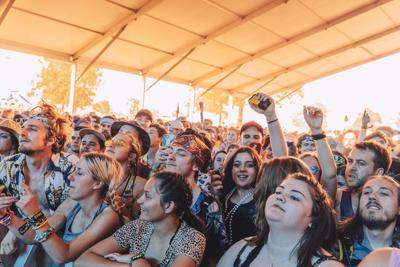The potential for bad weather is an age-old plight for outdoor festivals. No matter how epic the lineup, how many people are going or how much they’re looking forward to it, Mother Nature doesn’t care about our plans, and she can be powerful enough to shut down the show.
Last year’s post-lockdown festival season in Middle Tennessee was an unfortunate testament to the power of extreme weather. Thanks to Hurricane Ida, Bonnaroo’s Labor Day Weekend comeback got rained out before it even started. Less than a month later, Nashville’s Pride festival experienced heavy rains that pushed back the festival schedule and prevented some musicians from playing altogether. Responding to the weather that plagued both events, Nashville’s incredible roster of music venues stepped up quickly to provide stages for artists like Leon Bridges, Brittany Howard and Salt-N-Pepa after their festival appearances were canceled because of weather. That wasn’t the first time a fest in our area has struggled with precipitation — see the 2018 rainout of Pilgrimage — but hopefully we’re not in for a repeat this year.
To learn more about how weather affects festivals and how to prepare for it, the Scene reached out to Sam Herron, a meteorologist with the National Weather Service in Nashville. As far as weather forecasts and predictions go, meteorologists can get a sense of general seasonal trends, says Herron, but they can’t usually predict specific weather events more than a week out.
Herron says this summer will trend “hotter than normal and maybe a little bit drier than normal, but not radically so.” Hurricane season officially began June 1, though Hurricane Agatha made landfall in Mexico on May 30 — only the third time on record that an Eastern Pacific hurricane has made landfall that early. As the season continues, Tennessee could see some tropical storms move inland again. Herron notes that tropical storms can cause strong winds and rains in Tennessee; they can also spawn tornadoes.
“Although a lot of places may have a very hot, dry summer,” he says, “it only takes one tropical type of storm to come in and really wreck some plans, like it did with Bonnaroo.”
Even though you can’t control the weather, you can prepare for it. Check the forecast in the week leading up to outdoor events and pack accordingly. If it’s going to be hot, bring layers and make sure you have plenty of sunscreen and water. If it’s going to rain, bring ponchos (or umbrellas if they’re allowed) and consider an exit strategy if necessary.
Part of preparing is being mindful of the problems that different settings can present. Most of the places where you’ll camp and see shows at The Bonnaroo Farm are in fields where there isn’t much natural protection from storms. There aren’t a lot of opportunities for shelter, and it wouldn’t be easy to leave the grounds if a storm arose. According to its website, the festival is making “improovements” to mitigate the issues that led to the cancellation last year, like planning for stormwater management and adding paved roads. Requests for further comment didn’t receive a response by press time.
For downtown shindigs like Pride or the CMA Fest, shelter isn’t as much of a problem, but the temperature can climb more easily where there’s a lot of concrete. Whether you’re downtown or in the country, the sheer amount of people is something to consider — the bigger the event, the more difficult it can be to evacuate a crowd or reach people who need medical assistance.
“Even just normal summer heat can become extra dangerous when people aren’t maybe paying attention, they aren’t taking care of themselves, they aren’t staying hydrated,” says Herron. “Or [if] they’re just kind of pushing themselves physically and not really getting the rest and the amount of water that they need to deal with the conditions.” He also notes that other health conditions can be made worse when someone is dehydrated.
If you head out to any festival, make sure to check in with yourself and your friends throughout the day, especially if alcohol or other substances are involved. Maybe it seems like common sense, but it’s true: Wear sunscreen, hydrate, get plenty of rest and avoid being outside during the hottest points of the day if you can. Taking care of yourself not only prevents you from overdoing it and potentially missing a set you’ve been waiting to see, but it also prevents medical services from being overwhelmed and overstretched.
“Have fun,” says Herron. “But do it in a way that you’re not putting yourself at risk and not taxing the emergency services more than they need to be for those big events.”
The who, what, where, when and why of Bonnaroo and CMA Fest 2022






